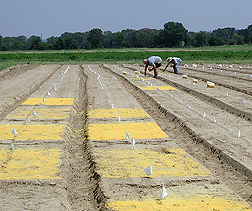This page has been archived and is being provided for reference purposes only. The page is no longer being updated, and therefore, links on the page may be invalid.
Read the magazine story to find out more. |
|
Cultivating Organic and Conventional Vegetable Production
By Jim CoreApril 19, 2006
Farmers who are considering a switch from conventional to organic production can now factor into their decision research findings from Agricultural Research Service (ARS) scientists in Lane, Okla.
There, at the ARS South Central Agricultural Research Laboratory, scientists are working to improve production systems for vegetable growers using conventional or organic methods.
For example, ARS plant physiologist Vincent Russo is developing organic vegetable crop production systems for growers who want to diversify from peanut and cow-calf/forage operations. To meet the needs of certified organic producers, Lane researchers are working to ensure that sound management practices are used.
Russo is investigating whether organic practices can produce vigorous vegetable seedlings. Initially, organically grown bell pepper transplants appeared to be less vigorous than those in a conventional potting soil. But further examination revealed that suggested rates for some commercial organic fertilizer products were inadequate.
Accordingly, Russo found that adding four times the label rate of an organic fertilizer to a commercially available, organically certified potting medium produced bell pepper seedlings similar to those grown with synthetic fertilizers and a conventional potting medium.
In addition, ARS agronomist Charles Webber is examining integrated vegetable production and weed-control systems using crop rotations, cover crops, and synthetic and organic herbicides. He is looking at alternative weed-control applications such as corn gluten meal, pelargonic acid (a fatty acid found in plants and animals) and vinegar (acetic acid).
Working with ARS technician Buddy Faulkenberry and James W. Shrefler, an Extension horticulturist at Oklahoma State University in Lane, Webber recently developed an innovative device for applying corn gluten meal to the soil surface.
Webber's team also studied vinegar, which had previously been identified as an organic herbicide, to determine acetic acid concentrations, application volumes and the use of adjuvants—additives such as orange oil or canola oil—to improve its performance.
Read more about this research in the April 2006 issue of Agricultural Research magazine.
ARS is the U.S. Department of Agriculture's principal scientific research agency.

